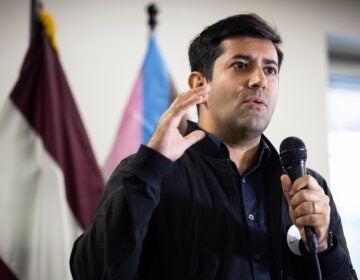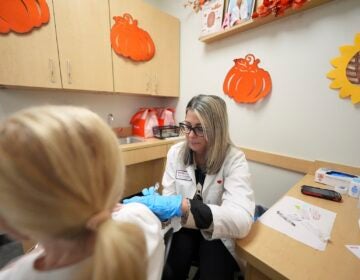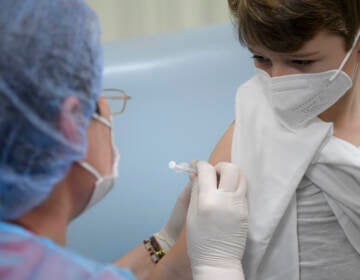Demand is strong for kids’ COVID-19 vaccines, pediatricians say
Doctors in the Delaware Valley are pleasantly surprised. An October survey had shown many parents against or hesitant about vaccination.
Listen 3:42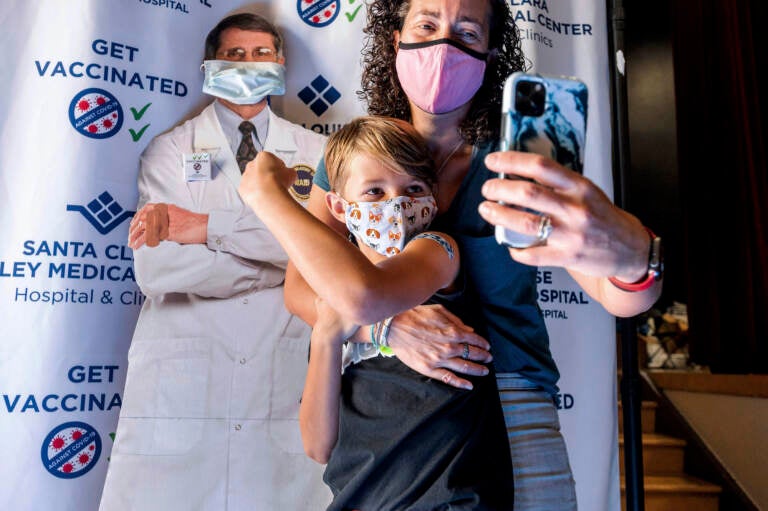
Finn Washburn, 9, shows his vaccination site as mom Kate Elsley takes a photo shortly after Finn received a Pfizer-BioNTech COVID-19 vaccine in San Jose, Calif., on Wednesday, Nov. 3, 2021. (AP Photo/Noah Berger)
This is one of a series of articles in which reporters from WHYY’s Health Desk Help Desk answer questions about vaccines and COVID-19 submitted by you, our audience.
When the Centers for Disease Control and Prevention approved the low-dose Pfizer COVID-19 vaccine for kids ages 5 to 11 earlier this month, pediatricians were concerned demand would be weak. A Kaiser Family Foundation survey published in October had reported that 30% of parents responded they would not vaccinate their kids. Another 33% said they would “wait and see,” while 5% said they would do so only if required. Of the parents surveyed, 27% said they would definitely get their kids vaccinated.
Yet physicians in the Delaware Valley say they’ve been pleasantly surprised by increasing interest in the vaccine.
“We just weren’t sure how this would go with the vaccine hesitancy that’s out there and the younger age range. We were a bit worried that parents might be hesitant to give the vaccine to their younger children, especially just after the emergency use authorization was announced,” said Dr. Scott Tomaine, a pediatrician at CHOP Primary Care, Flourtown in Montgomery County.
“But as soon as we had vaccine available, and as soon as we were able to get our marketing announcement out there, parents began calling and scheduling appointments. So we were very happy to see that,” Tomaine said.
As of last Wednesday, more than 7% of 5- to 11-year-olds in Philadelphia had received the first dose of the COVID-19 vaccine — that’s 10,079 kids. In addition, 41% of kids ages 12 to 17 were fully vaccinated as of Wednesday. The city does not track data for Philadelphia residents vaccinated in other counties.
Pennsylvania categorizes age groups differently. The state reports that 69,518 5- to 9-year-olds had the first dose of the vaccine as of Nov. 19 — that’s estimated to be more than 10% of kids in that age group. In addition, 137,174 doses had been administered to 5- to 11-year-olds as of last Wednesday, according to a press release. Of 10- to-14-year-olds in the state, 167,096 of them had been fully vaccinated by Nov. 19, or more than 23%. Among that same age group, 31% have had at least one dose, the state reports.
State data excludes Philadelphia, because the city administers its own vaccines.
In Delaware, as of Wednesday more than 10% of 5- to 11-year-olds had their first doses — that’s 8,480 kids. Of 12- to 17-year-olds, more than 58% had at least one dose as of Wednesday, or 41,358 kids.
As of Wednesday, 93,014 5- to-11-year-olds in New Jersey, more than 12%, had their first dose of the vaccine, while 514,832 12- to 15-year-olds had at least the first dose of the vaccine. Of all kids over 12, 60% have had at least one dose.
Tomaine and nurse practitioner Jennifer Keller were part of a team that helped set up 10 regional vaccine hubs throughout the Children’s Hospital of Philadelphia (CHOP) primary care network.
CHOP launched its vaccination clinics for the youngest age group on Nov. 13. As of early last week, CHOP had completed about 8,800 vaccines after two weekend clinics. The demand was so high that CHOP added an additional hub in southern New Jersey.
Tomaine and Keller said the demand for vaccines for 5- to 11-year-olds was higher than the demand for older kids. Keller surmised that could be because there were plenty of opportunities for kids over 12 to receive the vaccine at schools or pharmacies. On the other hand, people giving the shots to 5- to 11-year-olds must be trained in pediatric vaccine administration.
“So there have not been many pharmacies that were able to offer these families the ability to receive the vaccine, and there are fewer schools that have launched their own clinics,” Keller said. “Parents feel that their primary care provider is a trusted individual, and with this age cohort, they feel most comfortable receiving it in the primary care setting.”
Dr. Vibha Sanwal of Rainbow Pediatrics in Georgetown, Delaware, said she too has seen a strong demand for the vaccines for younger children. Her practice administers 10 vaccines a day on average. Since younger kids were approved to receive the vaccine, Rainbow Pediatrics has vaccinated around 100 kids within that age group.
The upcoming holidays have played a significant role in the demand, Sanwal said, as well as planned vacations.
“I had a family who was going on a cruise ship, and the cruise ship required vaccinations,” she said.
Sanwal said many parents ask questions about side effects and adverse events before agreeing to get their kids vaccinated. The most common questions have been around myocarditis, a type of rare heart inflammation.
“Everybody had one question: “Have you noticed myocarditis in this age group?” And I told them that … in the trial, myocarditis was not observed in any single case,” Sanwal said.
That’s why it’s so important to make vaccines available at pediatricians’ offices, she said. Sanwal informs parents and children about COVID-19 risks, and explains how the vaccine teaches the immune system to fight the virus. She informs kids that the vaccine makes antibodies, which she describes as “soldiers that fight the bad guy.”
“I think that really helps. A lot of kids laugh, and say, ‘Oh, I have soldiers in my body to fight the bad guy,’” Sanwal said.
“They want to feel more reassured at the doctor’s office. And they’re always afraid that something could happen. And I think some things would be lost when you go to the pharmacy or the vaccination hubs, which I know the state is trying their best. But I think the little kids, I feel that they feel more comfortable coming to the pediatrician’s office.”
For the first time in her practice’s 20-year history, physicians also are offering vaccines to the entire family. Sanwal said the approach has been particularly successful with her Spanish-speaking patients, who make up 80% of the practice.
“We actually had a family where we vaccinated the grandparents, the parents, the grandkids — all coming to our office to get the COVID 19 vaccine,” she said.
Sanwal said her practice still is vaccinating a steady flow of patients over 12, while Tomaine said requests from that age group have declined.
Tomaine encourages parents who have yet to vaccinate their kids to do so, and to reach out to CHOP with any questions they have.
“We hope that the more children that we vaccinate, the more children [we] will be able to vaccinate down the line. Because I hope that there probably are some parents who are still a little bit on the fence. But the hope is that they see their neighbors and their friends get vaccinated, and they realize that everything is OK and they’ll be more likely to get back and get their children vaccinated themselves,” he said.
“We just want to encourage parents to get their children vaccinated. This is the next step toward ending this pandemic. So if they can, please, please bring your children to one of these hubs to be vaccinated.”

Get daily updates from WHYY News!
WHYY is your source for fact-based, in-depth journalism and information. As a nonprofit organization, we rely on financial support from readers like you. Please give today.



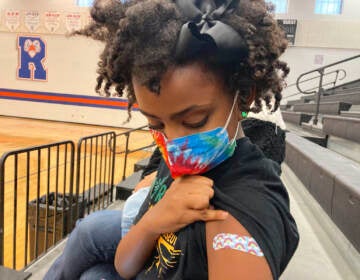
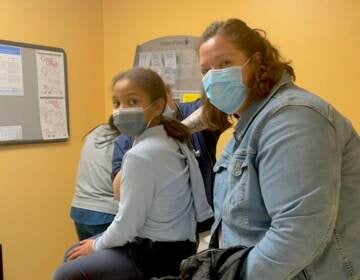

![CoronavirusPandemic_1024x512[1]](https://whyy.org/wp-content/uploads/2020/03/CoronavirusPandemic_1024x5121-300x150.jpg)
